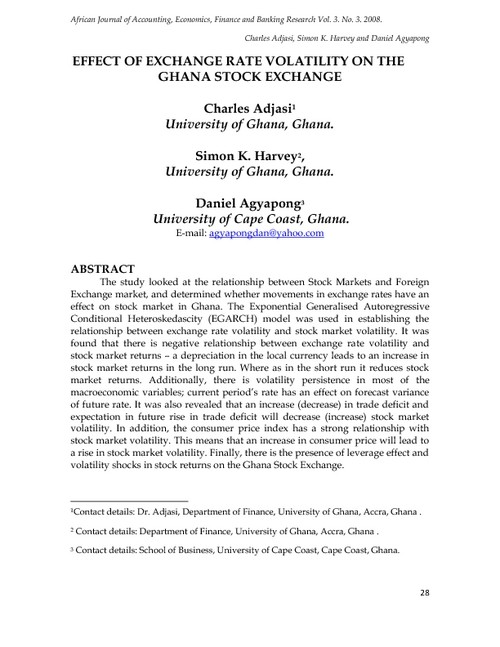Impact of the Volatility of Macroeconomic Variables on the Volatility of Stock Market Returns
Post on: 16 Март, 2015 No Comment

Emeka Nkoro (University of Port Harcourt, Nigeria) and Aham Kelvin Uko (University of Port Harcourt, Nigeria)
Export Reference
Abstract
This chapter investigates the relationship between volatility of macroeconomic variables and the volatility of Nigeria’s stock market returns using annual data from 1985-2009. The Macroeconomic variables used are: inflation rate, government expenditure, foreign exchange rate, index of manufacturing output, broad money supply, and minimum rediscount rate. In pursuance of this, the AR(1)-GARCH-X(1,1) model was used for the analysis. The findings of this study revealed that, Nigeria’s current stock market return is positively influenced by previous returns. Volatility of Nigeria’s stock market returns was affected by past volatility less than the related news from the previous period. Also, the result shows that there is a significantly positive relationship between the volatility of the Nigeria’s stock market returns and the short run deviations of the macroeconomic variables (macroeconomic factors volatility) in the system. The results provide some insight to investors, financial regulators, and policymakers in the Nigeria’s stock market when structuring their portfolios and formulating economic and financial policies.
Chapter Preview

Introduction
In last three decades many studies have examined associations between macroeconomic variables and stock returns. These studies include; Fama (1981, 1990), Geske and Roll (1983), and Chen, Roll, and Ross (1986). However, most of these studies focused on developed markets by using the Autoregressive Conditional Heteroscedasticity (ARCH) model and the Generalized ARCH (GARCH) model. For instance, Schwert (1989) and, Flannery and Protopapadakis (2002) tested the effect of domestic macroeconomic variables on stock volatility for the United States. They found weak evidence that such factors could predict stock market returns which are inherently volatile. With these studies, it becomes obvious that a clear understanding of stock market determinants is very important for investors, regulators, policy makers and, academic researchers.
This paper extends the previous research by investigating the reaction of stock returns volatility to short run deviation of the long run equilibrium of cointegrated series(i.e. short-run deviations between stock returns and a set of macroeconomic variables) within the framework of a Generalized Autoregressive Conditional Heteroscedasticity (GARCH) model. Specifically, the paper seeks to investigate the contemporaneous effects of changes in the volatility of the short run deviation on the long run equilibrium of cointegrated macroeconomic variables on volatility of stock market returns in Nigeria. That is, to examine whether macroeconomic factors collectively contribute to the dynamics of the Nigeria’s stock market. This study is inspired by the works of Shiller (1981) and, Hansen and Jagannathan (1991), which revealed that the volatility of real activity should be related to stock market volatility.














